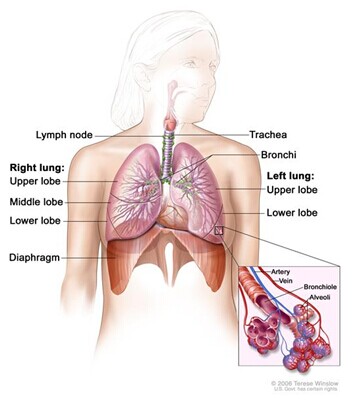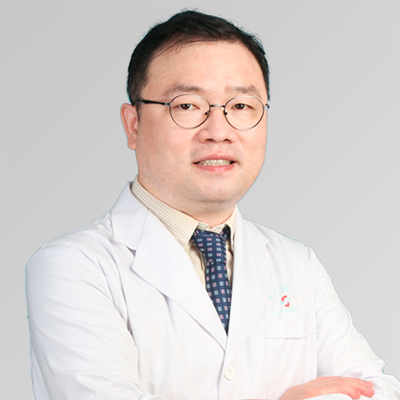This story begins with two sisters from Hong Kong.
In December 2022, the elder sister, Xiao (pseudonym), began experiencing headaches. Initially, she thought it was trigeminal neuralgia caused by periodontal disease, but repeated examinations found nothing abnormal. However, as her headaches and chest pains worsened, she underwent a chest CT scan at a local hospital, which revealed a 4.7 × 4.7 cm mass in the right upper lung near the hilum. She was eventually diagnosed with right lung adenocarcinoma, with multiple metastases to lymph nodes, bones, liver, lungs, and brain.
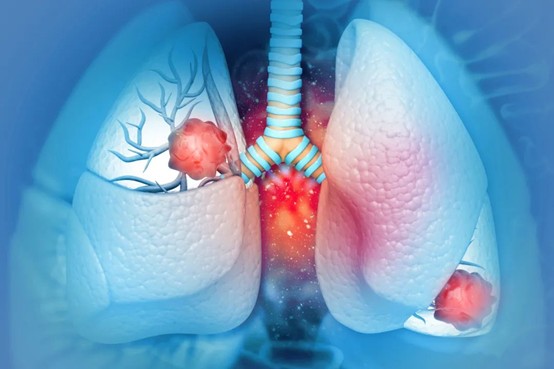
Genetic testing revealed an EGFR exon 19 deletion mutation, so Xiao began taking oral targeted therapy and received whole-brain radiotherapy along with local intensity-modulated therapy. However, she soon developed drug resistance. Despite multiple changes in medication and treatment adjustments, her cancer continued to progress, leaving local doctors at a loss. Xiao suffered immensely—she was unable to walk, her bones and thighs were immobile, and she relied entirely on a wheelchair. The level of pain she endured was described as “10 out of 10.”
Later, Xiao learned about cryoablation technology from an American friend and read news reports about Fuda Cancer Hospital in Guangzhou. Hoping to relieve her suffering, Xiao and her younger sister, Xia, went together to Fuda’s Medical Department One on March 30 of this year to seek treatment.
Based on admission examinations and her medical history, and in order to control the tumor locally and reduce tumor burden, the team at Medical Department One performed cryoablation to control the tumor in her right lung, combined with anti-angiogenic targeted therapy and intra-arterial infusion chemotherapy, allowing small doses of drugs to directly reach the tumor.
“Whether it’s interventional therapy or cryoablation, there’s no obvious discomfort. Targeted therapy feels just like a glucose infusion—you just lie in bed or walk around with this ‘Christmas tree IV stand.’” After each treatment, doctors provided liver- and kidney-protective care to reduce side effects. Compared with before, Xiao’s CT scans showed the tumor had shrunk.
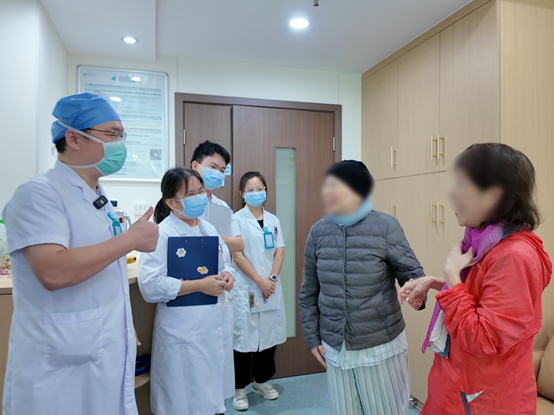
△ Assistant to the President and Deputy Director of Medical Department One, Long Xin’an, with attending physician Li Chunli, leading ward rounds
Xia, her younger sister, was not only a companion during the treatment but also a patient herself. Two years earlier, she had been found to have a lung nodule. At that time, the nodule was small, so only regular follow-ups were needed. Over time, however, it grew into a 0.7 cm ground-glass nodule. This year’s chest CT revealed multiple ground-glass nodules in both lungs, the largest located in the anterior basal segment of the right lower lobe—classified as intermediate risk.
Recalling that their father had died of lung cancer, and that among eight siblings, one sister had lung cancer and both she and her younger brother had lung nodules, Xia became determined to address her worrying lung nodule. She underwent cryoablation at Fuda Hospital. Fortunately, postoperative pathology confirmed it was benign.
“It was our own prejudice,” said their younger brother, Mr. Xu, who had come along specifically to see for himself whether the Fuda Hospital so highly praised by his sisters truly lived up to its reputation. Within just a few days, he had become an ardent supporter. Holding the hospital’s brochure in his hands, he flipped through it page by page, commenting on each section with visible admiration.
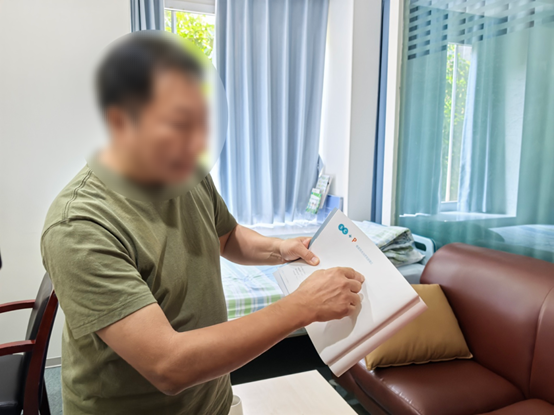
△ Younger brother Mr. Xu reviewing the hospital’s promotional materials
“Many of these techniques are not yet available in Hong Kong.” Before coming to Fuda, he thought medical treatments around the world were largely the same. But upon arriving, he felt as though he had stepped into a whole new world. He was particularly interested in Fuda’s unique “3C+P” treatment model—especially after witnessing his sister’s tangible improvement under this approach. “When my sister first arrived, every step caused pain and she needed a wheelchair. Now she can walk around with a cane, take care of herself, and has even gained over 10 pounds.”
In addition to advanced medical technologies, what impressed them most was Fuda’s exceptional service and comfortable medical environment. “During ward rounds, the medical staff enter in an orderly manner like a disciplined team, asking questions in detail. The nurses are practically on call around the clock.” The siblings also noticed that Fuda’s patients come from all over the world, and the hospital provides special facilities for international patients, such as a Buddhist hall, prayer room, and halal room. “In Hong Kong, even if you have money, it’s hard to enjoy this level of service because hospital beds are in such short supply.” Xiao still requires ongoing treatment, but each return trip to Fuda now feels like a journey—and she believes she will grow stronger along the way.

Did You Know? — Can Lung Cancer Be Inherited?
Lung cancer is not directly inherited, but genetic factors may increase an individual’s risk. This risk is most apparent in family clusters of the disease. If several family members across multiple generations have had lung cancer, certain genetic mutations or chromosomal abnormalities may be present, increasing the likelihood for descendants to develop the disease.
Research shows that first-degree relatives of lung cancer patients have more than double the risk compared to the general population. However, lung cancer develops as a result of multiple factors combined, including smoking, air pollution, occupational exposures, and chronic lung disease. Genetic predisposition is only one factor—it is not decisive.
Therefore, people with a long history of smoking, exposure to secondhand smoke or cooking oil fumes, long-term occupational exposure to radon, arsenic, beryllium, or their compounds, a family history of lung cancer, or chronic lung disease—especially those over the age of 40—are advised to undergo regular lung cancer screenings such as low-dose spiral CT, in order to detect potential early-stage lesions and improve survival rates.
